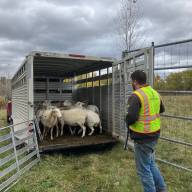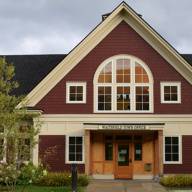There were two distinct calls to action at the annual Mad River Valley Chamber of Commerce meeting on September 24, one from keynote speaker Misha Golfman of the Mad River Path and the other from chamber executive director Eric Friedman.
Golfman, his board and a coalition of community partners are working on developing a multi-use alternative transportation corridor from Warren to Middlesex. Golfman told the group that the project is about more than infrastructure, likening it to an expedition requiring shared intention, sacrifice and “altruistic will.”
“It’s an honor,” Golfman said, reflecting on being asked to lead the initiative. “As an immigrant and a refugee to this country, it means a lot to be trusted with something so meaningful for the community.”
Golfman, a former wilderness expedition leader, drew on his experience guiding remote journeys to illustrate the planning and perseverance needed for the corridor’s success.
He likened The Valley’s tight-knit, outdoor-loving culture to that of a “voluntary expedition community” and praised residents for their shared values and commitment to place. But he cautioned that building the path will require discomfort, trade-offs, and collective resolve.
“We've decided as a society to prioritize speed,” Golfman said, referencing the wide highways and rising traffic fatalities. “Now we have a chance to choose something else – a path where children can bike to school, where elders can ride e-bikes to the grocery store, and where visitors can explore The Valley without cars.”
Central to Golfman’s message was the concept of will – both “egotistic” and “altruistic.” He argued that the kind of will that builds highways at the expense of safety can also be harnessed to create inclusive, community-serving infrastructure.
“Altruistic will is when you stop to help someone on the side of the road,” he said. “This path can be a physical manifestation of that – of noticing each other, slowing down, and choosing to care.”
Golfman emphasized that the path’s success will depend on more than planning documents and state approvals. “We’ve completed the engineering study,” he said. “We know it’s possible. But it won’t happen unless everyone here wants it to.”
He ended with a challenge: “No expedition succeeds without sacrifice. We’ll need landowners, businesses, nonprofits, and towns to walk this together. I’m ready to spend the rest of my career on this. Are you?”
Before Golfman spoke Friedman opened the meeting reflecting on a year marked by personal challenges and reaffirming the organization's role in a time of uncertainty.
Friedman, who spent three months in Boston undergoing cancer treatment, used his time away to reflect deeply on the value of the chamber’s work. “I had to step back and look at this organization from 30,000 feet,” he said. “I started asking myself, is it relevant? Is it important? Is it important to me?”
The answer, he concluded, was a resounding yes. “It matters now more than ever,” he told the crowd. “The chamber plays an incredibly important role in our community and will continue to do so – for our businesses and for The Valley as a whole.”
Friedman also honored Kim Donohue, co-owner of the Inn at the Round Barn, with the 2025 Win Smith Be Better Award, calling her a “true believer” in The Valley and a vital force in both local and statewide leadership.
“Kim has done the hard work – whether testifying at the Legislature, hosting community gatherings at her business, or just showing up again and again,” Friedman said. “Her dedication to our brand, our financial health, and our communal spirit is unmatched.”
In her remarks, Donohue recalled her first ride with Friedman to a tourism summit just before the pandemic began. “I think I either cried or complained the whole way there,” she joked. “Sometimes both.” But she said that spirit of teamwork has fueled their legislative advocacy efforts, even if it sometimes meant “being the one who cried in front of legislators.”
Friedman detailed the three pillars of the chamber’s work this year: marketing and promotion, professional development, and community engagement.
Under marketing, Friedman highlighted The Valley Reporter/chamber community calendar on the chamber’s website, which has become the second most visited page and a vital tool for businesses and visitors. “It took 10 years to get right,” he said, “and now it’s paying off.”
In professional development, Friedman cited a recent success story: when local business owners flagged inconsistent fire inspection standards, the chamber gathered data, built a case, and helped bring resolution through legislative channels.
“That’s the kind of quiet win that nobody notices – but it means fewer headaches for our businesses,” he said.
On the community engagement front, Friedman noted initiatives like the StewardMRV program, workplace safety workshops, and continued legislative advocacy – work he admitted he once doubted.
“As a former civics teacher, I used to scoff at lobbying,” he said. “Now I realize – it may not be sexy, but it works. Our Valley punches above its weight because we’re organized and we show up.”
Friedman closed with a call to action: “This is a time of uncertainty, and people want to do something. The chamber is that ‘something.’ It’s where business owners come together, solve problems, and support one another – and that’s never been more needed than right now.”
You might also like













